Financial Regulation Essay: Philip Morris Lobbying and Tobacco Control
VerifiedAdded on 2021/04/17
|17
|4099
|60
Essay
AI Summary
This essay delves into the lobbying activities of Philip Morris, a major international tobacco company, focusing on its interactions with financial regulations and tobacco control policies. It examines the company's history, its conflicts with the World Health Organization (WHO), and its strategies to influence policies related to tobacco consumption. The essay highlights the company's opposition to the Framework Convention on Tobacco Control (FCTC) and its attempts to shift focus from health concerns to financial losses, including the investment of significant resources in lobbying efforts. It also explores the broader context of lobbying within the tobacco industry, the financial implications of tobacco control measures, and the societal impact of tobacco consumption. The essay discusses the ethical considerations of lobbying and the conflicts of interest that arise when the tobacco industry attempts to shape laws and regulations. It also provides an overview of the financial investments made by the company and other related entities in lobbying activities. The essay concludes by emphasizing the detrimental effects of tobacco and the importance of effective tobacco control policies.
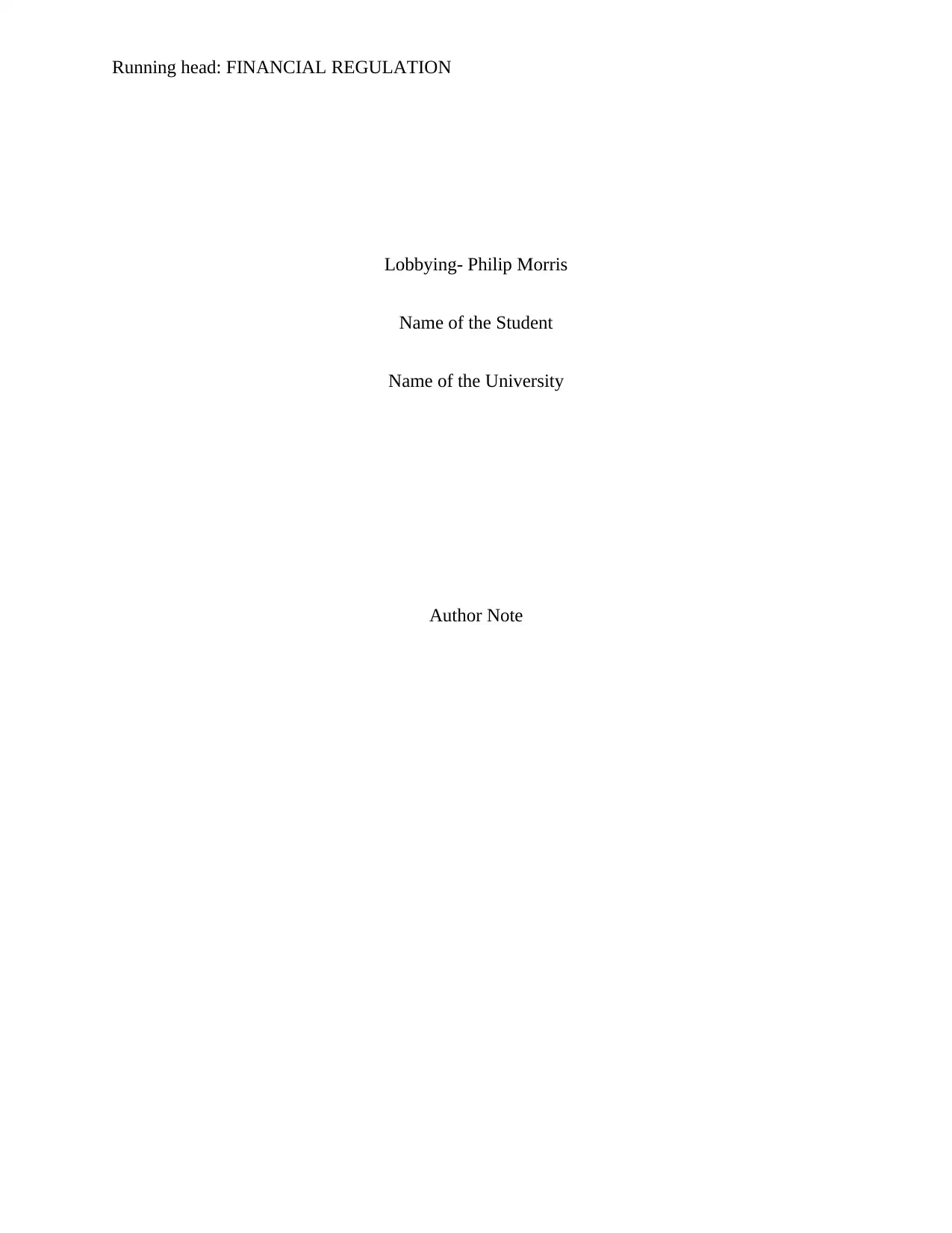
Running head: FINANCIAL REGULATION
Lobbying- Philip Morris
Name of the Student
Name of the University
Author Note
Lobbying- Philip Morris
Name of the Student
Name of the University
Author Note
Paraphrase This Document
Need a fresh take? Get an instant paraphrase of this document with our AI Paraphraser
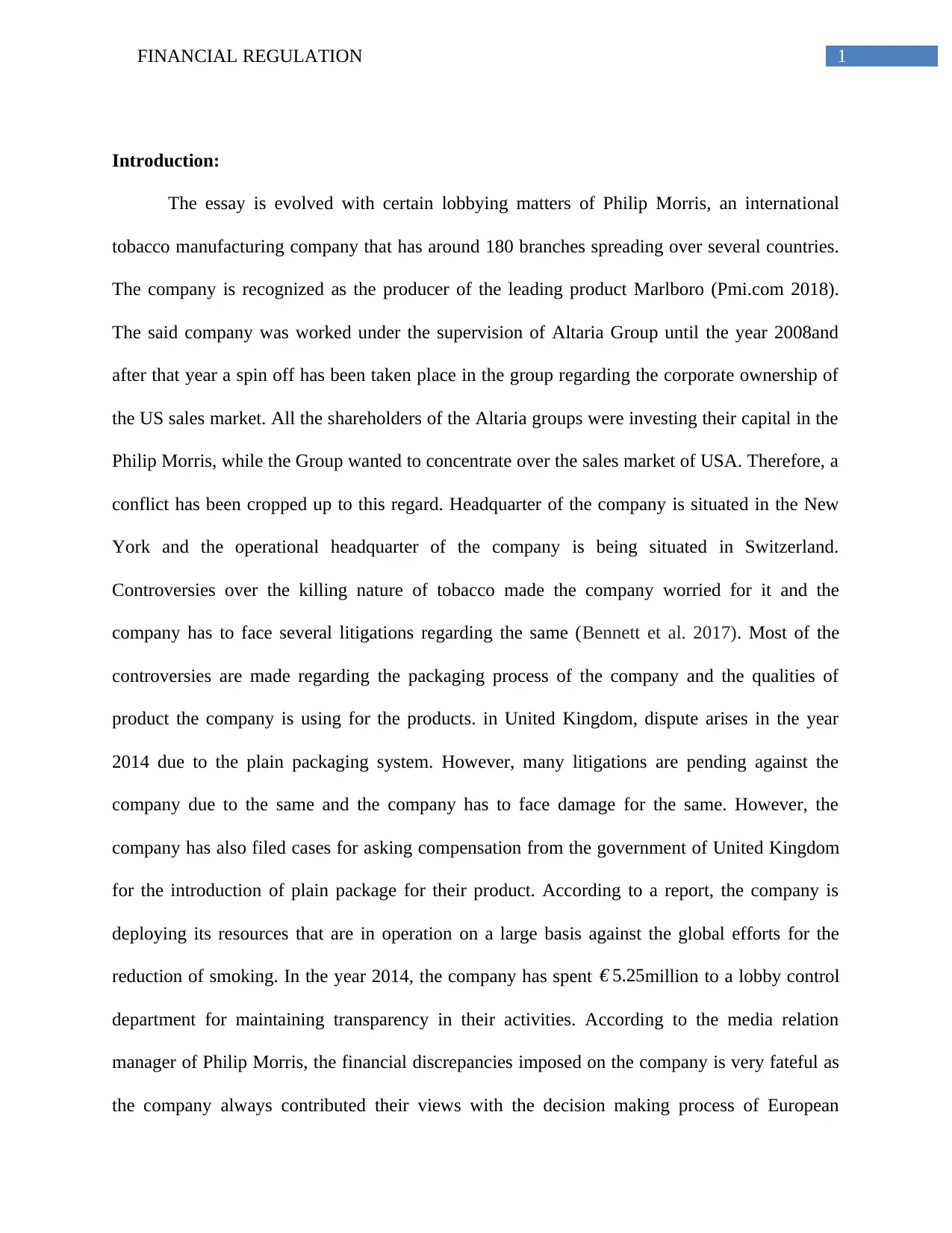
1FINANCIAL REGULATION
Introduction:
The essay is evolved with certain lobbying matters of Philip Morris, an international
tobacco manufacturing company that has around 180 branches spreading over several countries.
The company is recognized as the producer of the leading product Marlboro (Pmi.com 2018).
The said company was worked under the supervision of Altaria Group until the year 2008and
after that year a spin off has been taken place in the group regarding the corporate ownership of
the US sales market. All the shareholders of the Altaria groups were investing their capital in the
Philip Morris, while the Group wanted to concentrate over the sales market of USA. Therefore, a
conflict has been cropped up to this regard. Headquarter of the company is situated in the New
York and the operational headquarter of the company is being situated in Switzerland.
Controversies over the killing nature of tobacco made the company worried for it and the
company has to face several litigations regarding the same (Bennett et al. 2017). Most of the
controversies are made regarding the packaging process of the company and the qualities of
product the company is using for the products. in United Kingdom, dispute arises in the year
2014 due to the plain packaging system. However, many litigations are pending against the
company due to the same and the company has to face damage for the same. However, the
company has also filed cases for asking compensation from the government of United Kingdom
for the introduction of plain package for their product. According to a report, the company is
deploying its resources that are in operation on a large basis against the global efforts for the
reduction of smoking. In the year 2014, the company has spent € 5.25million to a lobby control
department for maintaining transparency in their activities. According to the media relation
manager of Philip Morris, the financial discrepancies imposed on the company is very fateful as
the company always contributed their views with the decision making process of European
Introduction:
The essay is evolved with certain lobbying matters of Philip Morris, an international
tobacco manufacturing company that has around 180 branches spreading over several countries.
The company is recognized as the producer of the leading product Marlboro (Pmi.com 2018).
The said company was worked under the supervision of Altaria Group until the year 2008and
after that year a spin off has been taken place in the group regarding the corporate ownership of
the US sales market. All the shareholders of the Altaria groups were investing their capital in the
Philip Morris, while the Group wanted to concentrate over the sales market of USA. Therefore, a
conflict has been cropped up to this regard. Headquarter of the company is situated in the New
York and the operational headquarter of the company is being situated in Switzerland.
Controversies over the killing nature of tobacco made the company worried for it and the
company has to face several litigations regarding the same (Bennett et al. 2017). Most of the
controversies are made regarding the packaging process of the company and the qualities of
product the company is using for the products. in United Kingdom, dispute arises in the year
2014 due to the plain packaging system. However, many litigations are pending against the
company due to the same and the company has to face damage for the same. However, the
company has also filed cases for asking compensation from the government of United Kingdom
for the introduction of plain package for their product. According to a report, the company is
deploying its resources that are in operation on a large basis against the global efforts for the
reduction of smoking. In the year 2014, the company has spent € 5.25million to a lobby control
department for maintaining transparency in their activities. According to the media relation
manager of Philip Morris, the financial discrepancies imposed on the company is very fateful as
the company always contributed their views with the decision making process of European
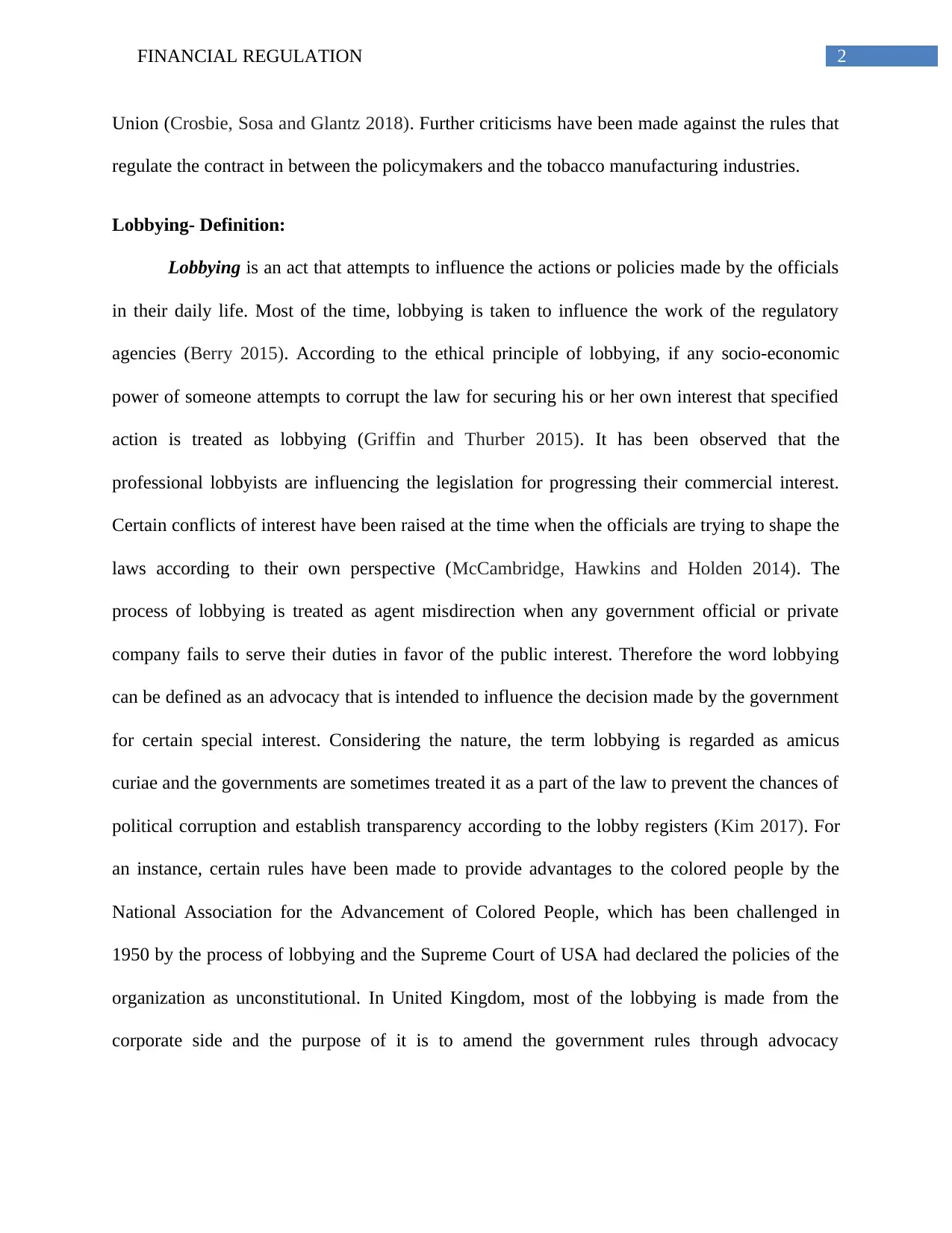
2FINANCIAL REGULATION
Union (Crosbie, Sosa and Glantz 2018). Further criticisms have been made against the rules that
regulate the contract in between the policymakers and the tobacco manufacturing industries.
Lobbying- Definition:
Lobbying is an act that attempts to influence the actions or policies made by the officials
in their daily life. Most of the time, lobbying is taken to influence the work of the regulatory
agencies (Berry 2015). According to the ethical principle of lobbying, if any socio-economic
power of someone attempts to corrupt the law for securing his or her own interest that specified
action is treated as lobbying (Griffin and Thurber 2015). It has been observed that the
professional lobbyists are influencing the legislation for progressing their commercial interest.
Certain conflicts of interest have been raised at the time when the officials are trying to shape the
laws according to their own perspective (McCambridge, Hawkins and Holden 2014). The
process of lobbying is treated as agent misdirection when any government official or private
company fails to serve their duties in favor of the public interest. Therefore the word lobbying
can be defined as an advocacy that is intended to influence the decision made by the government
for certain special interest. Considering the nature, the term lobbying is regarded as amicus
curiae and the governments are sometimes treated it as a part of the law to prevent the chances of
political corruption and establish transparency according to the lobby registers (Kim 2017). For
an instance, certain rules have been made to provide advantages to the colored people by the
National Association for the Advancement of Colored People, which has been challenged in
1950 by the process of lobbying and the Supreme Court of USA had declared the policies of the
organization as unconstitutional. In United Kingdom, most of the lobbying is made from the
corporate side and the purpose of it is to amend the government rules through advocacy
Union (Crosbie, Sosa and Glantz 2018). Further criticisms have been made against the rules that
regulate the contract in between the policymakers and the tobacco manufacturing industries.
Lobbying- Definition:
Lobbying is an act that attempts to influence the actions or policies made by the officials
in their daily life. Most of the time, lobbying is taken to influence the work of the regulatory
agencies (Berry 2015). According to the ethical principle of lobbying, if any socio-economic
power of someone attempts to corrupt the law for securing his or her own interest that specified
action is treated as lobbying (Griffin and Thurber 2015). It has been observed that the
professional lobbyists are influencing the legislation for progressing their commercial interest.
Certain conflicts of interest have been raised at the time when the officials are trying to shape the
laws according to their own perspective (McCambridge, Hawkins and Holden 2014). The
process of lobbying is treated as agent misdirection when any government official or private
company fails to serve their duties in favor of the public interest. Therefore the word lobbying
can be defined as an advocacy that is intended to influence the decision made by the government
for certain special interest. Considering the nature, the term lobbying is regarded as amicus
curiae and the governments are sometimes treated it as a part of the law to prevent the chances of
political corruption and establish transparency according to the lobby registers (Kim 2017). For
an instance, certain rules have been made to provide advantages to the colored people by the
National Association for the Advancement of Colored People, which has been challenged in
1950 by the process of lobbying and the Supreme Court of USA had declared the policies of the
organization as unconstitutional. In United Kingdom, most of the lobbying is made from the
corporate side and the purpose of it is to amend the government rules through advocacy
⊘ This is a preview!⊘
Do you want full access?
Subscribe today to unlock all pages.

Trusted by 1+ million students worldwide
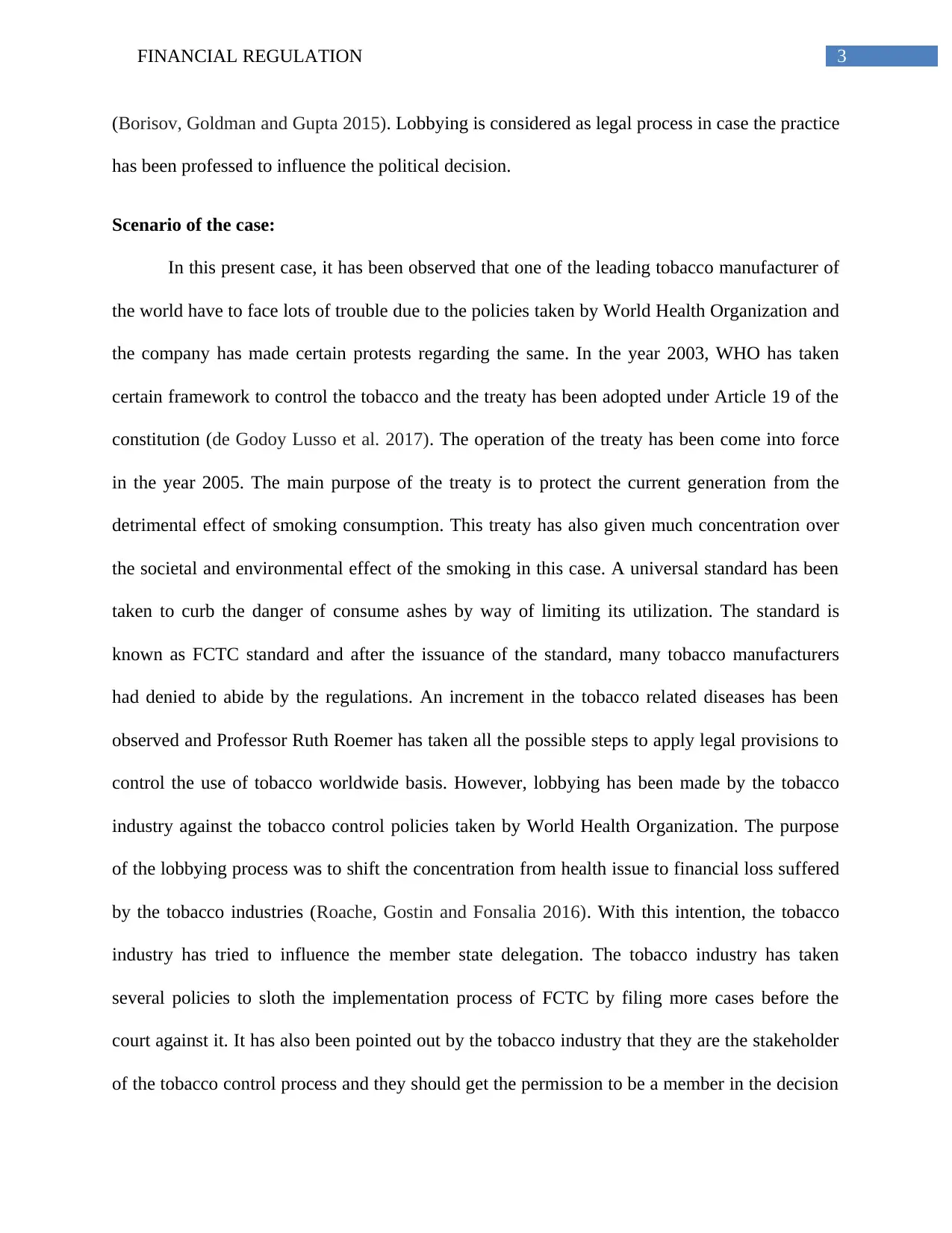
3FINANCIAL REGULATION
(Borisov, Goldman and Gupta 2015). Lobbying is considered as legal process in case the practice
has been professed to influence the political decision.
Scenario of the case:
In this present case, it has been observed that one of the leading tobacco manufacturer of
the world have to face lots of trouble due to the policies taken by World Health Organization and
the company has made certain protests regarding the same. In the year 2003, WHO has taken
certain framework to control the tobacco and the treaty has been adopted under Article 19 of the
constitution (de Godoy Lusso et al. 2017). The operation of the treaty has been come into force
in the year 2005. The main purpose of the treaty is to protect the current generation from the
detrimental effect of smoking consumption. This treaty has also given much concentration over
the societal and environmental effect of the smoking in this case. A universal standard has been
taken to curb the danger of consume ashes by way of limiting its utilization. The standard is
known as FCTC standard and after the issuance of the standard, many tobacco manufacturers
had denied to abide by the regulations. An increment in the tobacco related diseases has been
observed and Professor Ruth Roemer has taken all the possible steps to apply legal provisions to
control the use of tobacco worldwide basis. However, lobbying has been made by the tobacco
industry against the tobacco control policies taken by World Health Organization. The purpose
of the lobbying process was to shift the concentration from health issue to financial loss suffered
by the tobacco industries (Roache, Gostin and Fonsalia 2016). With this intention, the tobacco
industry has tried to influence the member state delegation. The tobacco industry has taken
several policies to sloth the implementation process of FCTC by filing more cases before the
court against it. It has also been pointed out by the tobacco industry that they are the stakeholder
of the tobacco control process and they should get the permission to be a member in the decision
(Borisov, Goldman and Gupta 2015). Lobbying is considered as legal process in case the practice
has been professed to influence the political decision.
Scenario of the case:
In this present case, it has been observed that one of the leading tobacco manufacturer of
the world have to face lots of trouble due to the policies taken by World Health Organization and
the company has made certain protests regarding the same. In the year 2003, WHO has taken
certain framework to control the tobacco and the treaty has been adopted under Article 19 of the
constitution (de Godoy Lusso et al. 2017). The operation of the treaty has been come into force
in the year 2005. The main purpose of the treaty is to protect the current generation from the
detrimental effect of smoking consumption. This treaty has also given much concentration over
the societal and environmental effect of the smoking in this case. A universal standard has been
taken to curb the danger of consume ashes by way of limiting its utilization. The standard is
known as FCTC standard and after the issuance of the standard, many tobacco manufacturers
had denied to abide by the regulations. An increment in the tobacco related diseases has been
observed and Professor Ruth Roemer has taken all the possible steps to apply legal provisions to
control the use of tobacco worldwide basis. However, lobbying has been made by the tobacco
industry against the tobacco control policies taken by World Health Organization. The purpose
of the lobbying process was to shift the concentration from health issue to financial loss suffered
by the tobacco industries (Roache, Gostin and Fonsalia 2016). With this intention, the tobacco
industry has tried to influence the member state delegation. The tobacco industry has taken
several policies to sloth the implementation process of FCTC by filing more cases before the
court against it. It has also been pointed out by the tobacco industry that they are the stakeholder
of the tobacco control process and they should get the permission to be a member in the decision
Paraphrase This Document
Need a fresh take? Get an instant paraphrase of this document with our AI Paraphraser
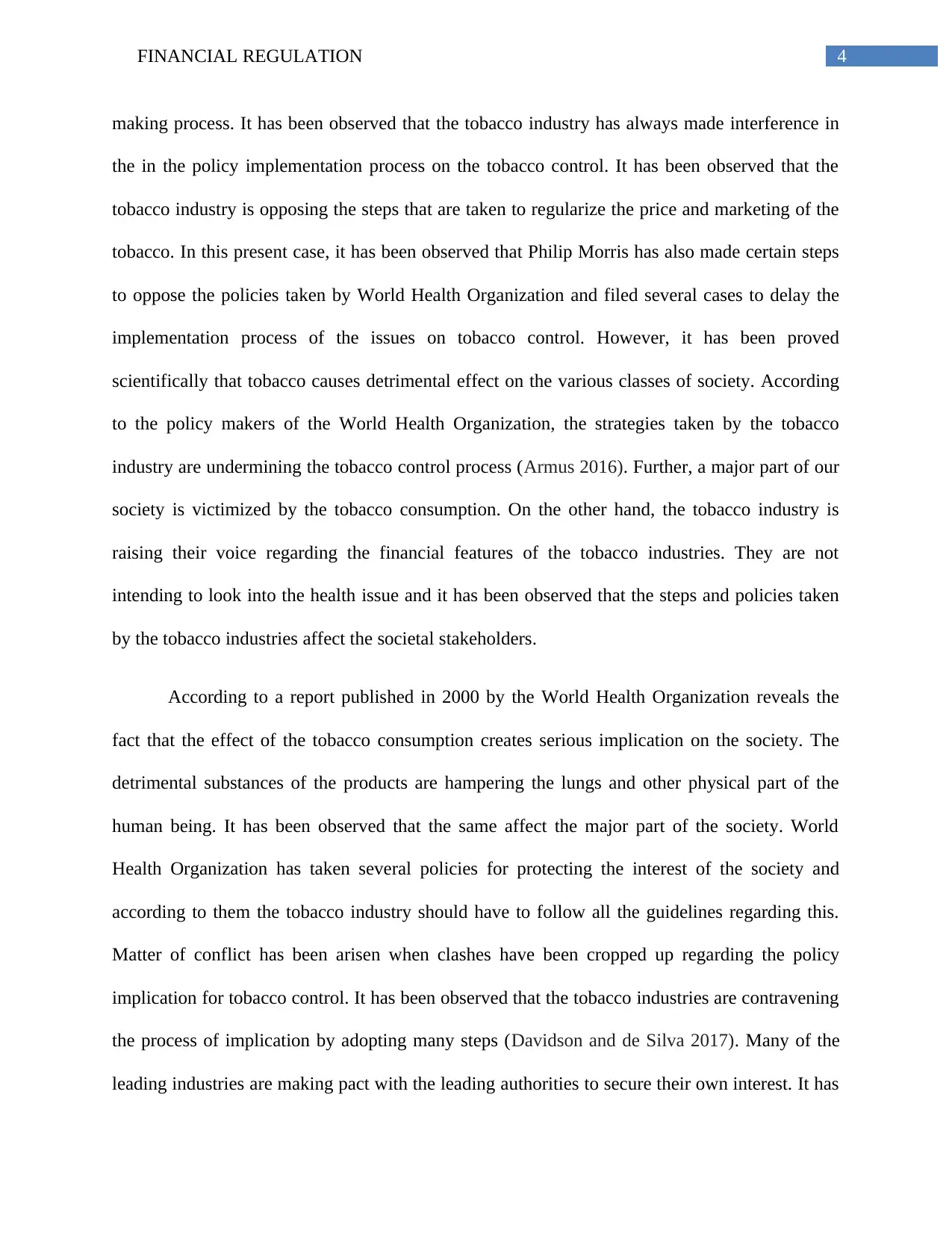
4FINANCIAL REGULATION
making process. It has been observed that the tobacco industry has always made interference in
the in the policy implementation process on the tobacco control. It has been observed that the
tobacco industry is opposing the steps that are taken to regularize the price and marketing of the
tobacco. In this present case, it has been observed that Philip Morris has also made certain steps
to oppose the policies taken by World Health Organization and filed several cases to delay the
implementation process of the issues on tobacco control. However, it has been proved
scientifically that tobacco causes detrimental effect on the various classes of society. According
to the policy makers of the World Health Organization, the strategies taken by the tobacco
industry are undermining the tobacco control process (Armus 2016). Further, a major part of our
society is victimized by the tobacco consumption. On the other hand, the tobacco industry is
raising their voice regarding the financial features of the tobacco industries. They are not
intending to look into the health issue and it has been observed that the steps and policies taken
by the tobacco industries affect the societal stakeholders.
According to a report published in 2000 by the World Health Organization reveals the
fact that the effect of the tobacco consumption creates serious implication on the society. The
detrimental substances of the products are hampering the lungs and other physical part of the
human being. It has been observed that the same affect the major part of the society. World
Health Organization has taken several policies for protecting the interest of the society and
according to them the tobacco industry should have to follow all the guidelines regarding this.
Matter of conflict has been arisen when clashes have been cropped up regarding the policy
implication for tobacco control. It has been observed that the tobacco industries are contravening
the process of implication by adopting many steps (Davidson and de Silva 2017). Many of the
leading industries are making pact with the leading authorities to secure their own interest. It has
making process. It has been observed that the tobacco industry has always made interference in
the in the policy implementation process on the tobacco control. It has been observed that the
tobacco industry is opposing the steps that are taken to regularize the price and marketing of the
tobacco. In this present case, it has been observed that Philip Morris has also made certain steps
to oppose the policies taken by World Health Organization and filed several cases to delay the
implementation process of the issues on tobacco control. However, it has been proved
scientifically that tobacco causes detrimental effect on the various classes of society. According
to the policy makers of the World Health Organization, the strategies taken by the tobacco
industry are undermining the tobacco control process (Armus 2016). Further, a major part of our
society is victimized by the tobacco consumption. On the other hand, the tobacco industry is
raising their voice regarding the financial features of the tobacco industries. They are not
intending to look into the health issue and it has been observed that the steps and policies taken
by the tobacco industries affect the societal stakeholders.
According to a report published in 2000 by the World Health Organization reveals the
fact that the effect of the tobacco consumption creates serious implication on the society. The
detrimental substances of the products are hampering the lungs and other physical part of the
human being. It has been observed that the same affect the major part of the society. World
Health Organization has taken several policies for protecting the interest of the society and
according to them the tobacco industry should have to follow all the guidelines regarding this.
Matter of conflict has been arisen when clashes have been cropped up regarding the policy
implication for tobacco control. It has been observed that the tobacco industries are contravening
the process of implication by adopting many steps (Davidson and de Silva 2017). Many of the
leading industries are making pact with the leading authorities to secure their own interest. It has
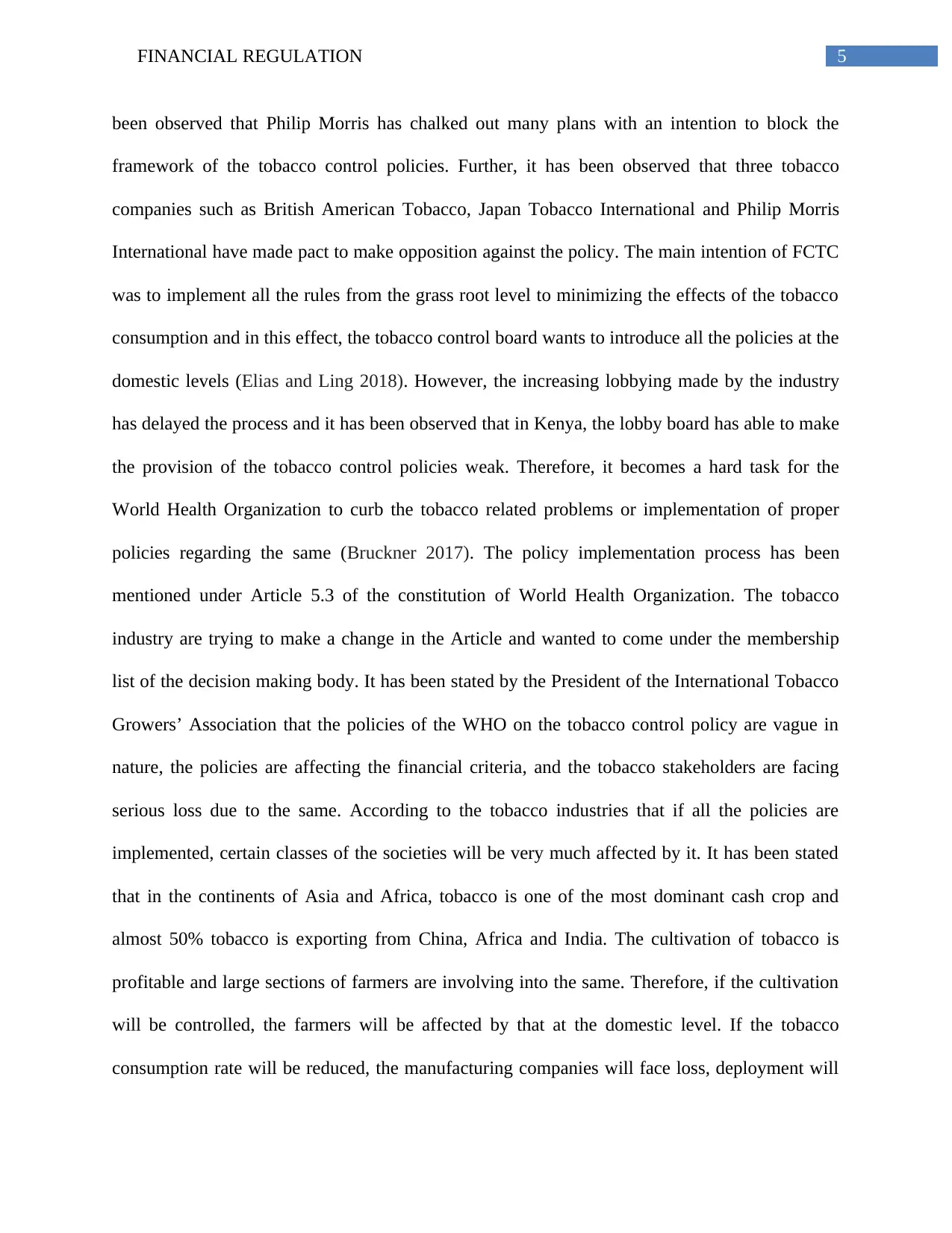
5FINANCIAL REGULATION
been observed that Philip Morris has chalked out many plans with an intention to block the
framework of the tobacco control policies. Further, it has been observed that three tobacco
companies such as British American Tobacco, Japan Tobacco International and Philip Morris
International have made pact to make opposition against the policy. The main intention of FCTC
was to implement all the rules from the grass root level to minimizing the effects of the tobacco
consumption and in this effect, the tobacco control board wants to introduce all the policies at the
domestic levels (Elias and Ling 2018). However, the increasing lobbying made by the industry
has delayed the process and it has been observed that in Kenya, the lobby board has able to make
the provision of the tobacco control policies weak. Therefore, it becomes a hard task for the
World Health Organization to curb the tobacco related problems or implementation of proper
policies regarding the same (Bruckner 2017). The policy implementation process has been
mentioned under Article 5.3 of the constitution of World Health Organization. The tobacco
industry are trying to make a change in the Article and wanted to come under the membership
list of the decision making body. It has been stated by the President of the International Tobacco
Growers’ Association that the policies of the WHO on the tobacco control policy are vague in
nature, the policies are affecting the financial criteria, and the tobacco stakeholders are facing
serious loss due to the same. According to the tobacco industries that if all the policies are
implemented, certain classes of the societies will be very much affected by it. It has been stated
that in the continents of Asia and Africa, tobacco is one of the most dominant cash crop and
almost 50% tobacco is exporting from China, Africa and India. The cultivation of tobacco is
profitable and large sections of farmers are involving into the same. Therefore, if the cultivation
will be controlled, the farmers will be affected by that at the domestic level. If the tobacco
consumption rate will be reduced, the manufacturing companies will face loss, deployment will
been observed that Philip Morris has chalked out many plans with an intention to block the
framework of the tobacco control policies. Further, it has been observed that three tobacco
companies such as British American Tobacco, Japan Tobacco International and Philip Morris
International have made pact to make opposition against the policy. The main intention of FCTC
was to implement all the rules from the grass root level to minimizing the effects of the tobacco
consumption and in this effect, the tobacco control board wants to introduce all the policies at the
domestic levels (Elias and Ling 2018). However, the increasing lobbying made by the industry
has delayed the process and it has been observed that in Kenya, the lobby board has able to make
the provision of the tobacco control policies weak. Therefore, it becomes a hard task for the
World Health Organization to curb the tobacco related problems or implementation of proper
policies regarding the same (Bruckner 2017). The policy implementation process has been
mentioned under Article 5.3 of the constitution of World Health Organization. The tobacco
industry are trying to make a change in the Article and wanted to come under the membership
list of the decision making body. It has been stated by the President of the International Tobacco
Growers’ Association that the policies of the WHO on the tobacco control policy are vague in
nature, the policies are affecting the financial criteria, and the tobacco stakeholders are facing
serious loss due to the same. According to the tobacco industries that if all the policies are
implemented, certain classes of the societies will be very much affected by it. It has been stated
that in the continents of Asia and Africa, tobacco is one of the most dominant cash crop and
almost 50% tobacco is exporting from China, Africa and India. The cultivation of tobacco is
profitable and large sections of farmers are involving into the same. Therefore, if the cultivation
will be controlled, the farmers will be affected by that at the domestic level. If the tobacco
consumption rate will be reduced, the manufacturing companies will face loss, deployment will
⊘ This is a preview!⊘
Do you want full access?
Subscribe today to unlock all pages.

Trusted by 1+ million students worldwide
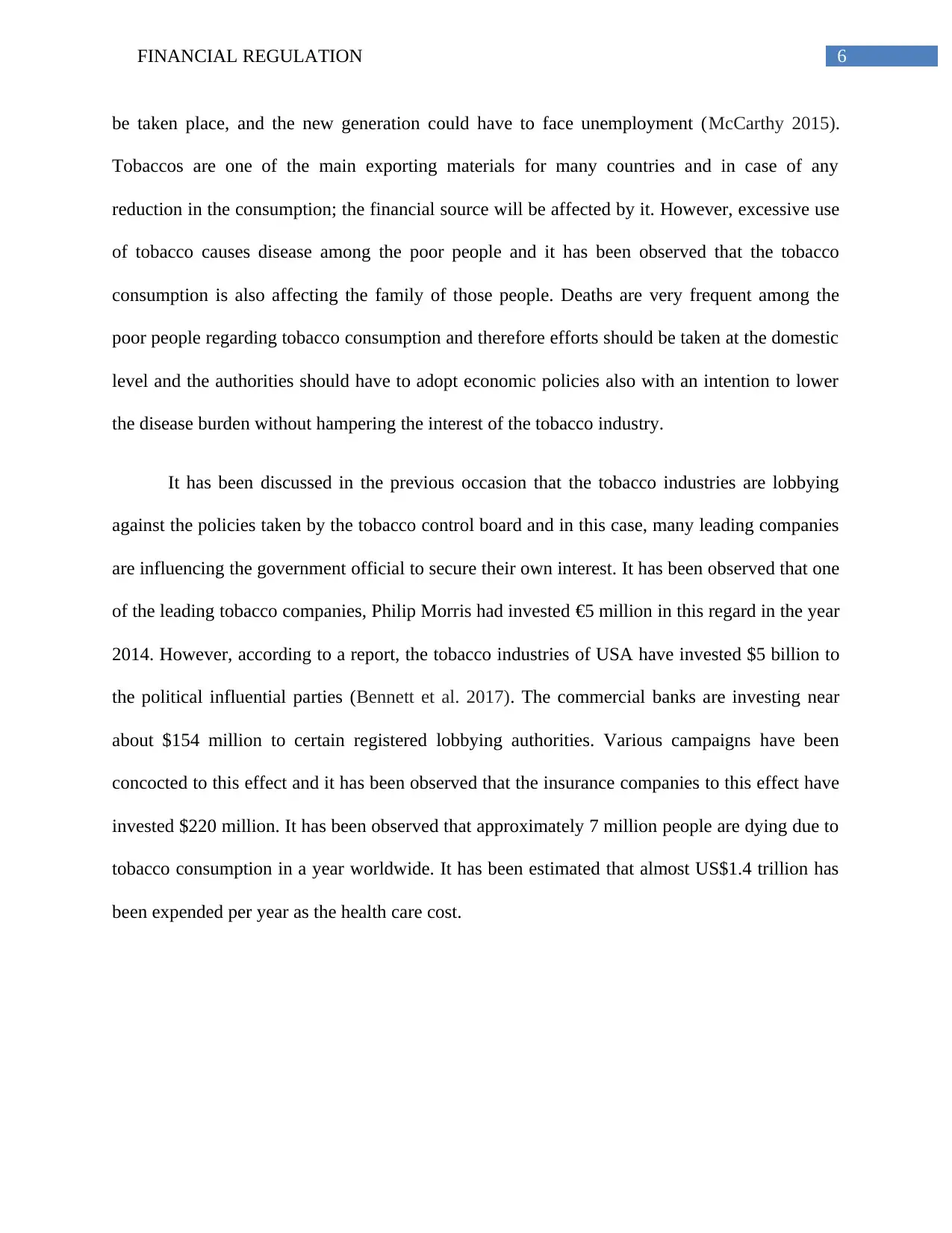
6FINANCIAL REGULATION
be taken place, and the new generation could have to face unemployment (McCarthy 2015).
Tobaccos are one of the main exporting materials for many countries and in case of any
reduction in the consumption; the financial source will be affected by it. However, excessive use
of tobacco causes disease among the poor people and it has been observed that the tobacco
consumption is also affecting the family of those people. Deaths are very frequent among the
poor people regarding tobacco consumption and therefore efforts should be taken at the domestic
level and the authorities should have to adopt economic policies also with an intention to lower
the disease burden without hampering the interest of the tobacco industry.
It has been discussed in the previous occasion that the tobacco industries are lobbying
against the policies taken by the tobacco control board and in this case, many leading companies
are influencing the government official to secure their own interest. It has been observed that one
of the leading tobacco companies, Philip Morris had invested €5 million in this regard in the year
2014. However, according to a report, the tobacco industries of USA have invested $5 billion to
the political influential parties (Bennett et al. 2017). The commercial banks are investing near
about $154 million to certain registered lobbying authorities. Various campaigns have been
concocted to this effect and it has been observed that the insurance companies to this effect have
invested $220 million. It has been observed that approximately 7 million people are dying due to
tobacco consumption in a year worldwide. It has been estimated that almost US$1.4 trillion has
been expended per year as the health care cost.
be taken place, and the new generation could have to face unemployment (McCarthy 2015).
Tobaccos are one of the main exporting materials for many countries and in case of any
reduction in the consumption; the financial source will be affected by it. However, excessive use
of tobacco causes disease among the poor people and it has been observed that the tobacco
consumption is also affecting the family of those people. Deaths are very frequent among the
poor people regarding tobacco consumption and therefore efforts should be taken at the domestic
level and the authorities should have to adopt economic policies also with an intention to lower
the disease burden without hampering the interest of the tobacco industry.
It has been discussed in the previous occasion that the tobacco industries are lobbying
against the policies taken by the tobacco control board and in this case, many leading companies
are influencing the government official to secure their own interest. It has been observed that one
of the leading tobacco companies, Philip Morris had invested €5 million in this regard in the year
2014. However, according to a report, the tobacco industries of USA have invested $5 billion to
the political influential parties (Bennett et al. 2017). The commercial banks are investing near
about $154 million to certain registered lobbying authorities. Various campaigns have been
concocted to this effect and it has been observed that the insurance companies to this effect have
invested $220 million. It has been observed that approximately 7 million people are dying due to
tobacco consumption in a year worldwide. It has been estimated that almost US$1.4 trillion has
been expended per year as the health care cost.
Paraphrase This Document
Need a fresh take? Get an instant paraphrase of this document with our AI Paraphraser
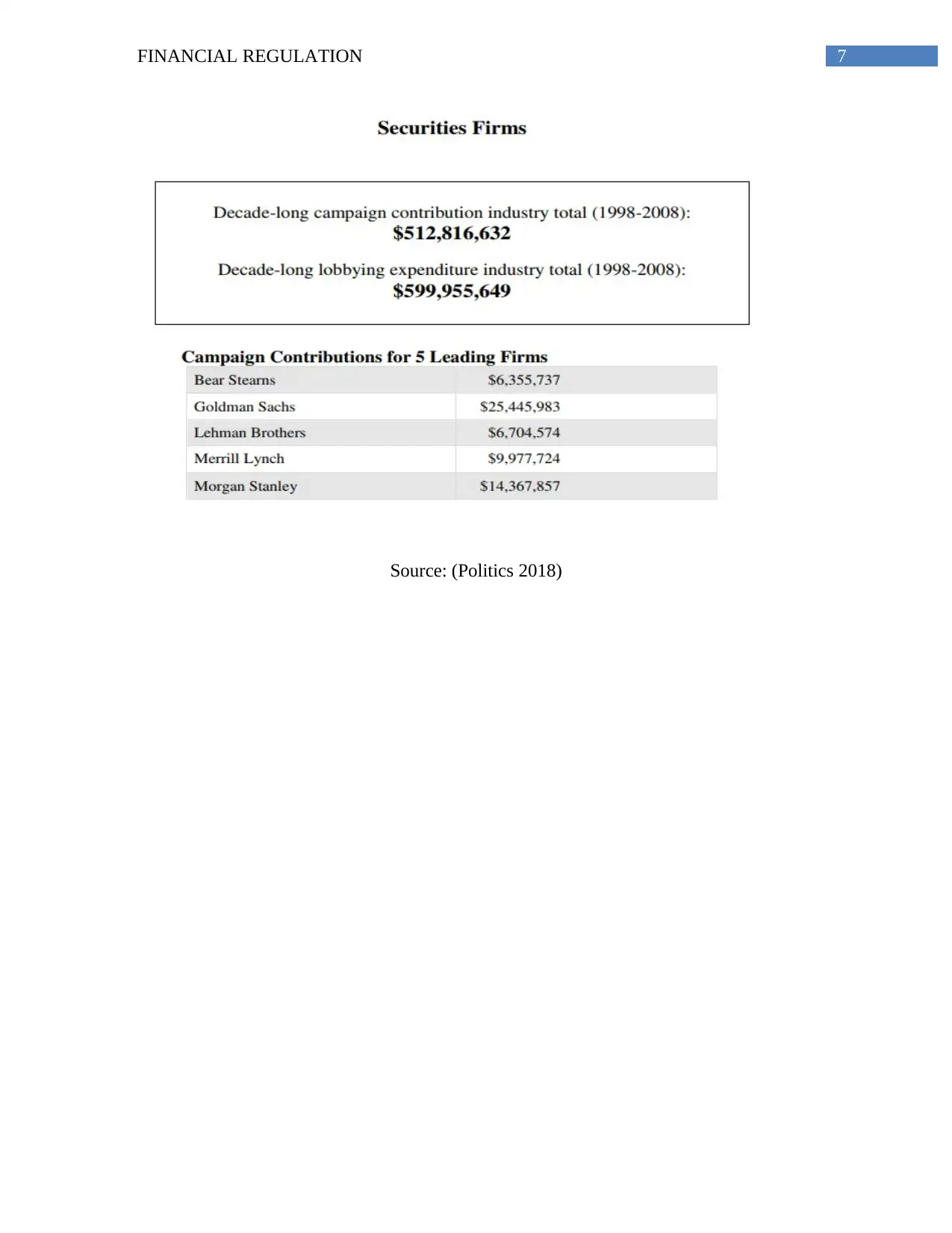
7FINANCIAL REGULATION
Source: (Politics 2018)
Source: (Politics 2018)
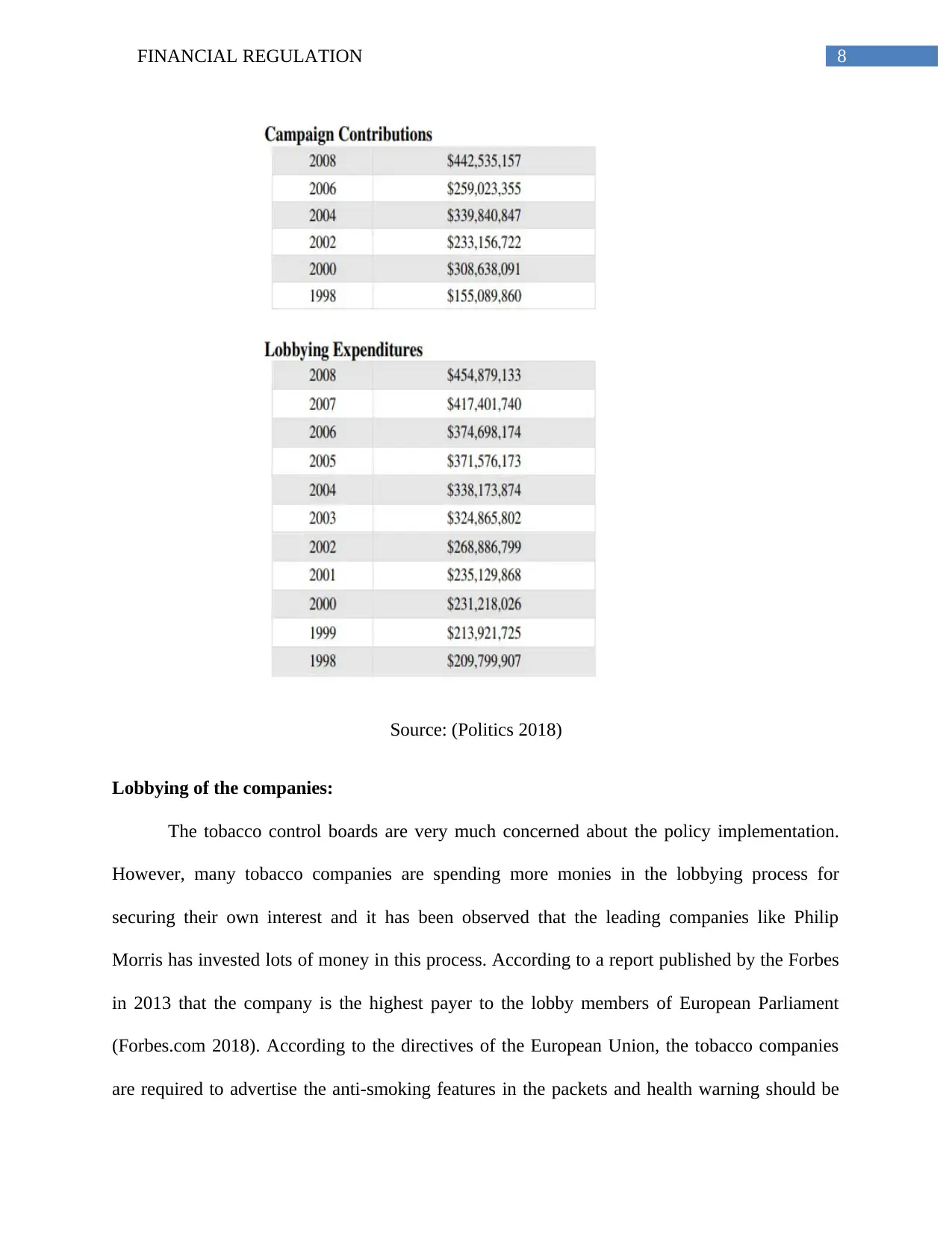
8FINANCIAL REGULATION
Source: (Politics 2018)
Lobbying of the companies:
The tobacco control boards are very much concerned about the policy implementation.
However, many tobacco companies are spending more monies in the lobbying process for
securing their own interest and it has been observed that the leading companies like Philip
Morris has invested lots of money in this process. According to a report published by the Forbes
in 2013 that the company is the highest payer to the lobby members of European Parliament
(Forbes.com 2018). According to the directives of the European Union, the tobacco companies
are required to advertise the anti-smoking features in the packets and health warning should be
Source: (Politics 2018)
Lobbying of the companies:
The tobacco control boards are very much concerned about the policy implementation.
However, many tobacco companies are spending more monies in the lobbying process for
securing their own interest and it has been observed that the leading companies like Philip
Morris has invested lots of money in this process. According to a report published by the Forbes
in 2013 that the company is the highest payer to the lobby members of European Parliament
(Forbes.com 2018). According to the directives of the European Union, the tobacco companies
are required to advertise the anti-smoking features in the packets and health warning should be
⊘ This is a preview!⊘
Do you want full access?
Subscribe today to unlock all pages.

Trusted by 1+ million students worldwide
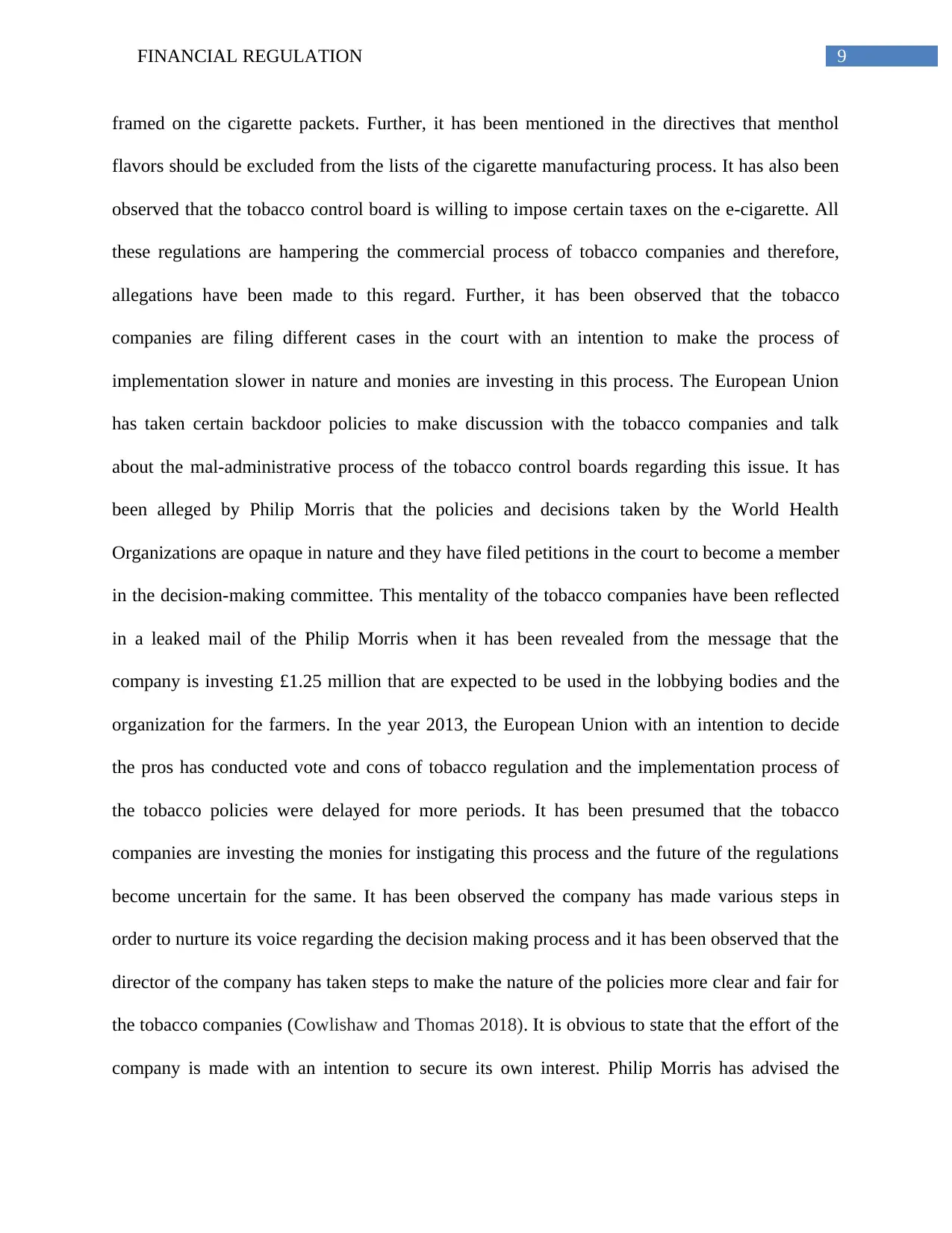
9FINANCIAL REGULATION
framed on the cigarette packets. Further, it has been mentioned in the directives that menthol
flavors should be excluded from the lists of the cigarette manufacturing process. It has also been
observed that the tobacco control board is willing to impose certain taxes on the e-cigarette. All
these regulations are hampering the commercial process of tobacco companies and therefore,
allegations have been made to this regard. Further, it has been observed that the tobacco
companies are filing different cases in the court with an intention to make the process of
implementation slower in nature and monies are investing in this process. The European Union
has taken certain backdoor policies to make discussion with the tobacco companies and talk
about the mal-administrative process of the tobacco control boards regarding this issue. It has
been alleged by Philip Morris that the policies and decisions taken by the World Health
Organizations are opaque in nature and they have filed petitions in the court to become a member
in the decision-making committee. This mentality of the tobacco companies have been reflected
in a leaked mail of the Philip Morris when it has been revealed from the message that the
company is investing £1.25 million that are expected to be used in the lobbying bodies and the
organization for the farmers. In the year 2013, the European Union with an intention to decide
the pros has conducted vote and cons of tobacco regulation and the implementation process of
the tobacco policies were delayed for more periods. It has been presumed that the tobacco
companies are investing the monies for instigating this process and the future of the regulations
become uncertain for the same. It has been observed the company has made various steps in
order to nurture its voice regarding the decision making process and it has been observed that the
director of the company has taken steps to make the nature of the policies more clear and fair for
the tobacco companies (Cowlishaw and Thomas 2018). It is obvious to state that the effort of the
company is made with an intention to secure its own interest. Philip Morris has advised the
framed on the cigarette packets. Further, it has been mentioned in the directives that menthol
flavors should be excluded from the lists of the cigarette manufacturing process. It has also been
observed that the tobacco control board is willing to impose certain taxes on the e-cigarette. All
these regulations are hampering the commercial process of tobacco companies and therefore,
allegations have been made to this regard. Further, it has been observed that the tobacco
companies are filing different cases in the court with an intention to make the process of
implementation slower in nature and monies are investing in this process. The European Union
has taken certain backdoor policies to make discussion with the tobacco companies and talk
about the mal-administrative process of the tobacco control boards regarding this issue. It has
been alleged by Philip Morris that the policies and decisions taken by the World Health
Organizations are opaque in nature and they have filed petitions in the court to become a member
in the decision-making committee. This mentality of the tobacco companies have been reflected
in a leaked mail of the Philip Morris when it has been revealed from the message that the
company is investing £1.25 million that are expected to be used in the lobbying bodies and the
organization for the farmers. In the year 2013, the European Union with an intention to decide
the pros has conducted vote and cons of tobacco regulation and the implementation process of
the tobacco policies were delayed for more periods. It has been presumed that the tobacco
companies are investing the monies for instigating this process and the future of the regulations
become uncertain for the same. It has been observed the company has made various steps in
order to nurture its voice regarding the decision making process and it has been observed that the
director of the company has taken steps to make the nature of the policies more clear and fair for
the tobacco companies (Cowlishaw and Thomas 2018). It is obvious to state that the effort of the
company is made with an intention to secure its own interest. Philip Morris has advised the
Paraphrase This Document
Need a fresh take? Get an instant paraphrase of this document with our AI Paraphraser
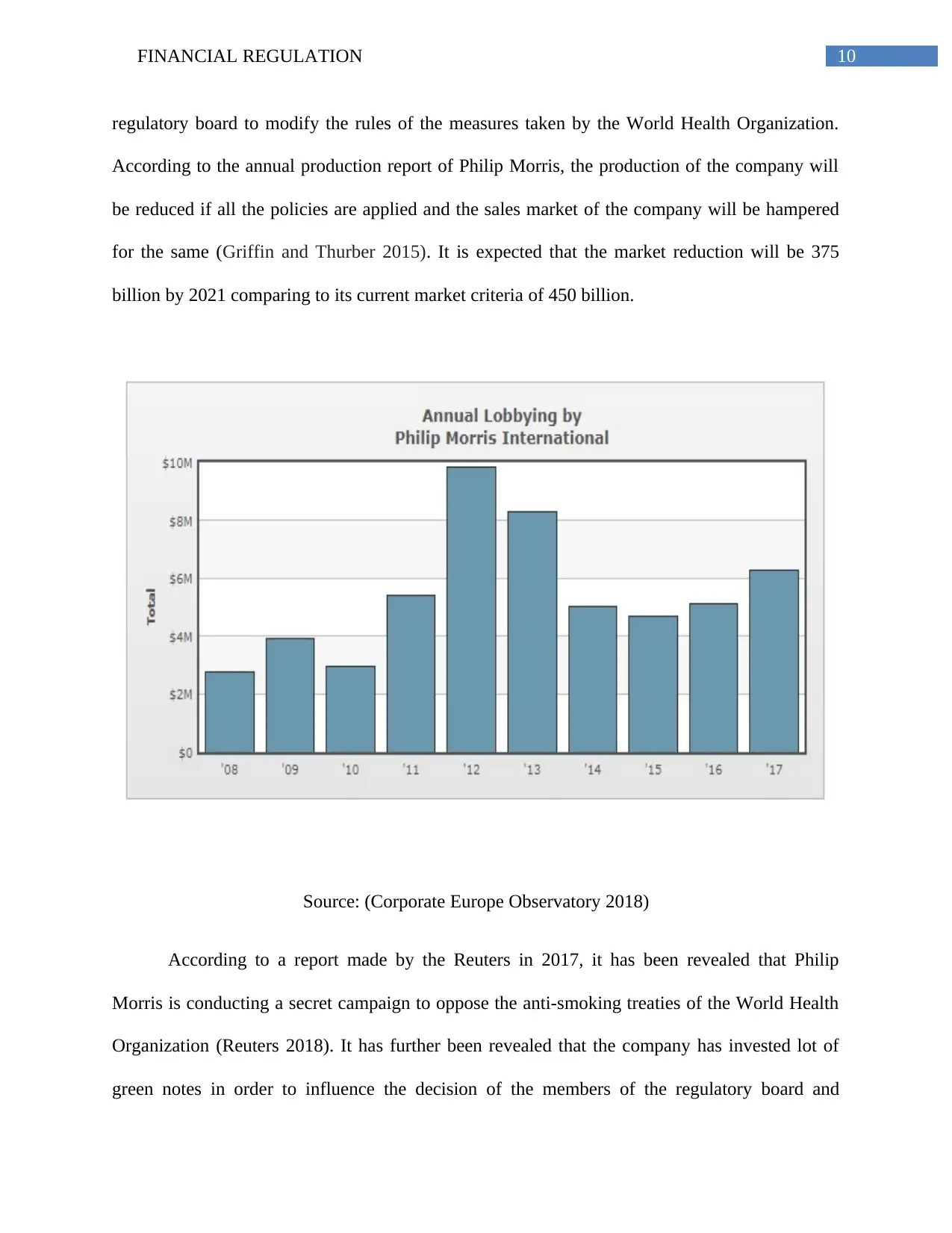
10FINANCIAL REGULATION
regulatory board to modify the rules of the measures taken by the World Health Organization.
According to the annual production report of Philip Morris, the production of the company will
be reduced if all the policies are applied and the sales market of the company will be hampered
for the same (Griffin and Thurber 2015). It is expected that the market reduction will be 375
billion by 2021 comparing to its current market criteria of 450 billion.
Source: (Corporate Europe Observatory 2018)
According to a report made by the Reuters in 2017, it has been revealed that Philip
Morris is conducting a secret campaign to oppose the anti-smoking treaties of the World Health
Organization (Reuters 2018). It has further been revealed that the company has invested lot of
green notes in order to influence the decision of the members of the regulatory board and
regulatory board to modify the rules of the measures taken by the World Health Organization.
According to the annual production report of Philip Morris, the production of the company will
be reduced if all the policies are applied and the sales market of the company will be hampered
for the same (Griffin and Thurber 2015). It is expected that the market reduction will be 375
billion by 2021 comparing to its current market criteria of 450 billion.
Source: (Corporate Europe Observatory 2018)
According to a report made by the Reuters in 2017, it has been revealed that Philip
Morris is conducting a secret campaign to oppose the anti-smoking treaties of the World Health
Organization (Reuters 2018). It has further been revealed that the company has invested lot of
green notes in order to influence the decision of the members of the regulatory board and
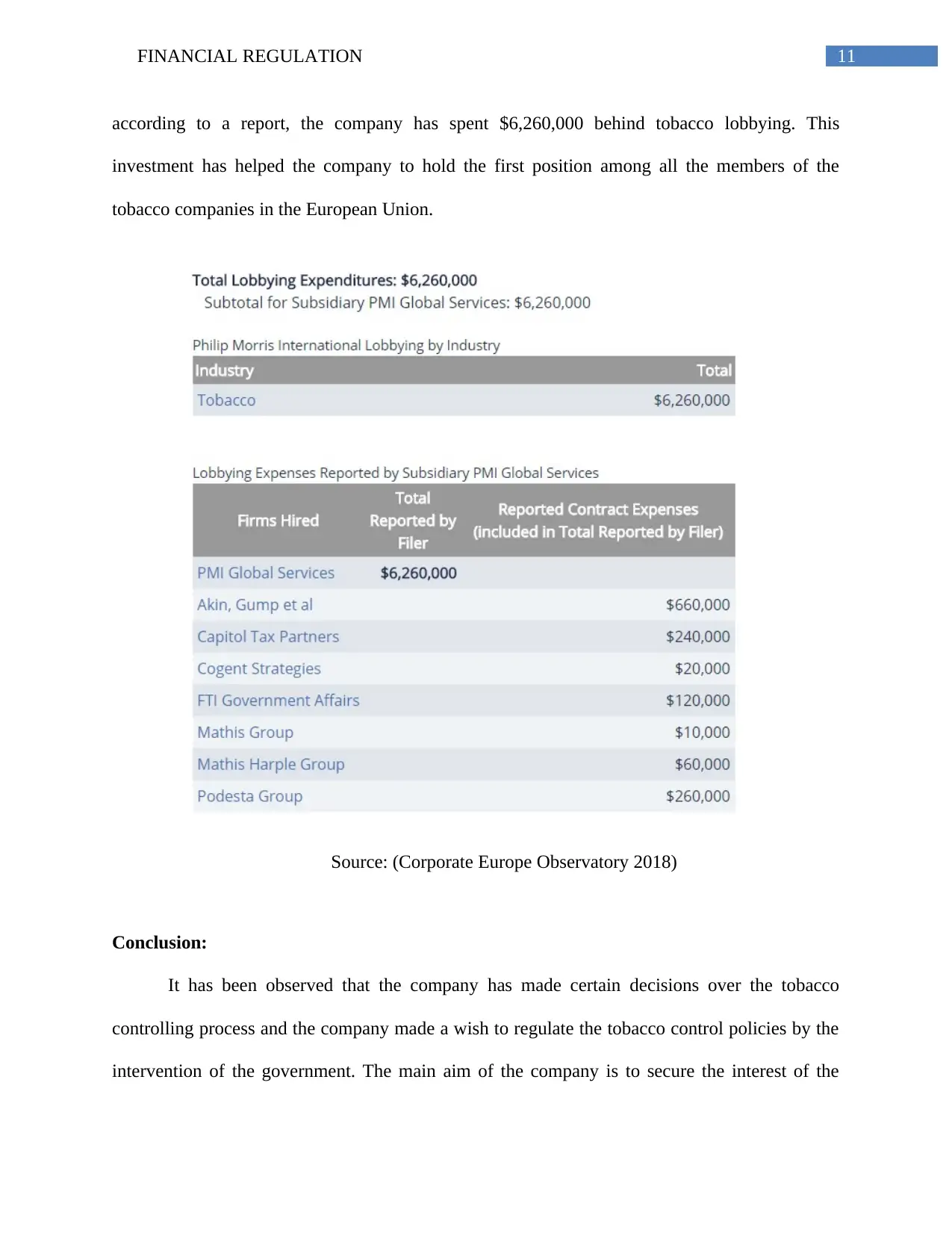
11FINANCIAL REGULATION
according to a report, the company has spent $6,260,000 behind tobacco lobbying. This
investment has helped the company to hold the first position among all the members of the
tobacco companies in the European Union.
Source: (Corporate Europe Observatory 2018)
Conclusion:
It has been observed that the company has made certain decisions over the tobacco
controlling process and the company made a wish to regulate the tobacco control policies by the
intervention of the government. The main aim of the company is to secure the interest of the
according to a report, the company has spent $6,260,000 behind tobacco lobbying. This
investment has helped the company to hold the first position among all the members of the
tobacco companies in the European Union.
Source: (Corporate Europe Observatory 2018)
Conclusion:
It has been observed that the company has made certain decisions over the tobacco
controlling process and the company made a wish to regulate the tobacco control policies by the
intervention of the government. The main aim of the company is to secure the interest of the
⊘ This is a preview!⊘
Do you want full access?
Subscribe today to unlock all pages.

Trusted by 1+ million students worldwide
1 out of 17
Related Documents
Your All-in-One AI-Powered Toolkit for Academic Success.
+13062052269
info@desklib.com
Available 24*7 on WhatsApp / Email
![[object Object]](/_next/static/media/star-bottom.7253800d.svg)
Unlock your academic potential
Copyright © 2020–2025 A2Z Services. All Rights Reserved. Developed and managed by ZUCOL.





